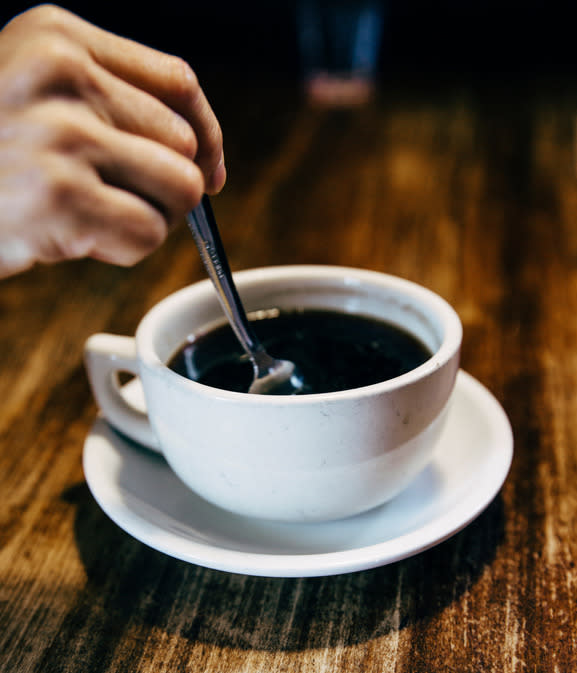Go Ahead, Drink More Coffee

Go ahead, have that third cup of coffee. (Stocksy)
New research from Harvard University has found it may decrease your risk of dying from a host of diseases — and even lower your risk of suicide.
For the study, which was published in the journal Circulation, researchers analyzed coffee consumption of more than 208,000 people over 30 years, as well as cause of death. Their coffee drinking was assessed every four years using food questionnaires.
Related: Your Body Within an Hour of Drinking a Cup of Coffee
Researchers discovered that people who drank one to five cups of decaf or regular coffee a day had a lower risk of mortality than those who didn’t. They were specifically less likely to die from heart disease, neurological diseases, Type 2 diabetes, and suicide. (They did not find a significant association between cancer and coffee consumption.)
Coffee consumption has already been linked with a lower risk of heart disease. An analysis of 36 studies published last year in the journal Circulation found that people who drink three to five cups of coffee a day were at the lowest risk of developing heart disease. (People who drank five or more cups a day didn’t have a higher risk than those who drank no coffee.)
Previous research published in the journal Diabetes Care also found that moderate consumption of decaf and regular coffee can lower a person’s risk of developing Type 2 diabetes.
But the suicide link is especially intriguing. Can regularly drinking coffee really reduce a chance that someone will commit suicide?
Study co-author Qi Sun, MD, an assistant professor in the Department of Nutrition at the Harvard T.H. Chan School of Public Health, says yes. “It’s probably because of the caffeine,” he tells Yahoo Health. “It’s a central part of coffee and it’s known to boost people’s moods and make them feel happy.”
While the study found the effect was similar for regular and decaf coffee, Sun points out that decaf still contains a certain amount of caffeine.
According to the Centers for Disease Control and Prevention, more than 40,000 Americans commit suicide each year, making it the 10th leading cause of death.
Previous research has also established a link between a lowered risk of suicide and coffee consumption. A 16-year Harvard study published in the World Journal of Biological Psychiatry in 2013 found that drinking two to four cups of caffeinated coffee a day can lower a person’s risk of suicide by 50 percent.
“At low to moderate doses, caffeine has well-known psycho-stimulant effects, such as improved psychomotor performance, increased vigilance, elevated arousal, and increased sensations of well-being and energy,” Michel Lucas, PhD, a visiting scientist at the Harvard T.H. Chan School of Public Health, who co-authored the 2013 coffee study, tells Yahoo Health.
But he says more may be at play than just caffeine: “It is possible that non-coffee drinkers are predisposed to depression/suicide because of other reasons and that increasing their coffee intake will not help.”
While the reason for the link is still somewhat unclear, Lucas says recent research should reassure coffee drinkers that their daily cup (or three) may be boosting their health.
However, he says people shouldn’t misinterpret the results. “We’re not at the point where we can say, ‘Drink coffee so you won’t get depressed,’” he says.
Related: 30 Things You May Not Have Realized About Coffee
Research has found there’s a limit to the benefits of coffee drinking and a person’s suicide risk. A study published in the European Journal of Epidemiology found that people who drank eight or more cups of coffee a day had a 58 percent greater risk of suicide than those who drank less.
Sun stresses that coffee isn’t the answer for everything, but it can help a person stay healthy. “Coffee is not a magic bullet,” he says. “But if you can drink coffee as part of a health diet and lifestyle, that will be great.”
Let’s keep in touch! Follow Yahoo Health on Facebook, Twitter, Instagram, and Pinterest. Have a personal health story to share? We want to hear it. Tell us atYHTrueStories@yahoo.com.
